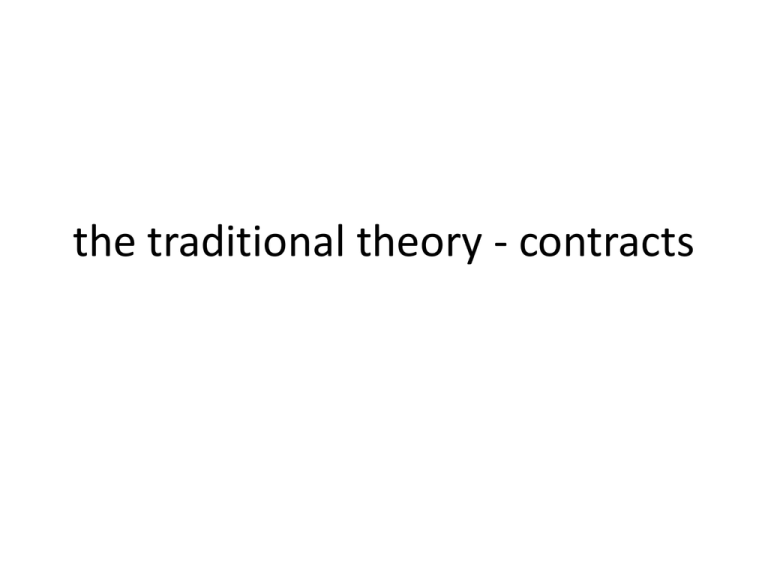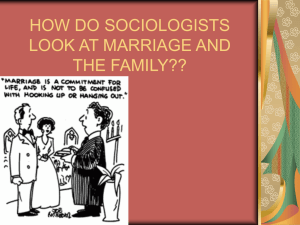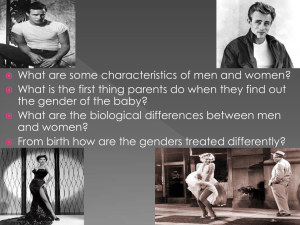
the traditional theory - contracts
§ 332. Law Governing Validity Of Contract
The law of the place of contracting determines
the validity and effect of a promise with respect
to
(a) capacity to make the contract;
(b) the necessary form, if any, in which the
promise must be made;
(c) the mutual assent or consideration, if any,
required to make a promise binding;
(d) any other requirements for making a promise
binding;…
Problems:
where is place of contracting?
circularity problem
characterization
frustrating expectations of parties
frustrating state interests
• § 348
• Whether a right under a contract is capable of
being transferred by the owner, is determined
by the law of the place of contracting.
• § 352
• The formalities necessary to make an effective
assignment of a right under an informal
contract are determined by the law of the
place of assignment.
• § 361
• The law of the place of performance
determines the details of the manner of
performing the duty imposed by the contract.
• Place of Performance
– Manner of performance
– Time and locality of performance
– Excuse for non-performance
– Also right to damages and measure of
damages
property
immovables
In re Barrie’s Estate
(Iowa 1949)
Law of the situs
- validity of will/effectiveness of
revocation
- intestate succession
- marital rights (e.g. dower)
movables
Movables:
law of domicile at death for:
- validity of will/effectiveness of revocation
- intestate succession
law of marital domicile for:
- marital interests
law of situs for:
- formalities of valid conveyance
Section 208
Whether an interest in a tangible
thing is classified as real or
personal property is determined by
the law of the state where the
thing is.
domicile
White v Tennant
(W.Va. 1888)
§ 15. Domicil Of Choice
(1) A domicil of choice is a domicil acquired,
through the exercise of his own will, by a
person who is legally capable of changing his
domicil.
(2) To acquire a domicil of choice, a person must
establish a dwelling-place with the intention
of making it his home.
(3) The fact of physical presence at a dwellingplace and the intention to make it a home
must concur; if they do so, even for a
moment, the change of domicil takes place.
§ 15. Domicil Of Choice
(1) A domicil of choice is a domicil acquired,
through the exercise of his own will, by a
person who is legally capable of changing his
domicil.
(2) To acquire a domicil of choice, a person must
establish a dwelling-place with the intention
of making it his home.
(3) The fact of physical presence at a dwellingplace and the intention to make it a home
must concur; if they do so, even for a
moment, the change of domicil takes place.
• “Even when the point of destination is not
reached, domicile may shift in itinere, if the
abandonment of the old domicile and the
setting out for the new, are plainly shown.”
• A lawsuit, brought in West Virginia, is attempting to
determine whether White is a domiciliary of West
Virginia or Pennsylvania.
• White lived in West Virginia until he was convicted of a
federal crime in West Virginia and sent to prison in
Pennsylvania.
• There he died.
• Under the law of Pennsylvania, prisoners have the
domicile they had before imprisoned, since
Pennsylvania follows the approach that a person
cannot acquire a domicil of choice by any act done
under legal or physical compulsion.
• Under West Virginia law White is domiciled in
Pennsylvania, since he intended to remain in that state
after release. How should the West Virginia court
decide?
§ 10. Domicil By What Law Determined
(1) A question of domicil as between the state of
the forum and another state is determined by
the law of the forum.
domicile
residence
nationality
habitual residence
marriage
sub-constitutional choice of law rules
NOT constitutional restrictions on choice
of law under Full Faith and Credit Clause
NOT constitutional restrictions on a
state’s marriage law under Equal
Protection Clause
status of marriage
effects of marriage
• § 121. Law Governing Validity Of Marriage
• Except as stated in §§ 131 and 132, a marriage
is valid everywhere if the requirements of the
marriage law of the state where the contract
of marriage takes place are complied with.
• Two domiciliaries of Massachusetts of the same sex
enter into a marriage in Virginia, which does not
allow for same-sex marriages.
• Would the marriage be recognized in Massachusetts
under 1st Rest.?
• § 122. Requirements Of State Of Celebration
• A marriage is invalid everywhere if any
mandatory requirement of the marriage law
of the state in which the marriage is
celebrated is not complied with.
§ 132. Marriage Declared Void By Law Of Domicil
A marriage which is against the law of the state of
domicil of either party, though the requirements of
the law of the state of celebration have been
complied with, will be invalid everywhere in the
following cases:
(a) polygamous marriage,
(b) incestuous marriage between persons so closely
related that their marriage is contrary to a strong
public policy of the domicil,
(c) marriage between persons of different races where
such marriages are at the domicil regarded as
odious,
(d) marriage of a domiciliary which a statute at the
domicil makes void even though celebrated in
another state.
2nd Rest § 283(2)
A marriage which satisfies the
requirements of the state where the
marriage was contracted will everywhere
be recognized as valid unless it violates the
strong public policy of another state which
had the most significant relationship to the
spouses and the marriage at the time of
the marriage.
A same sex couple domiciled in
Virginia get married in
Massachusetts. Assuming that a
st
Massachusetts court uses the 1
Rest., will it recognize the
marriage?
Uniform Marriage Evasion Act (adopted
Massachusetts’s 1913):
No marriage shall be contracted in this
commonwealth by a party residing and
intending to continue to reside in
another jurisdiction if such marriage
would be void if contracted in such
other jurisdiction, and every marriage
contracted in this commonwealth in
violation hereof shall be null and void.
§ 134. Marriage Contrary To Public Policy
If any effect of a marriage created by the law of
one state is deemed by the courts of another
state sufficiently offensive to the policy of the
latter state, the latter state will refuse to give
that effect to the marriage.
• X and Y, an interracial couple, are married in
Illinois, which allows such marriages. Both are
domiciled in Illinois. Will they be allowed to
live together if they move to Mississippi, which
prohibits such marriages?
corporations
internal affairs doctrine
X Corp. is incorporated in
Delaware.
By law of Delaware a corporation
is not liable for the torts of its
agents
An agent of the X Corp. commits
tort in Pennsylvania, where
corporations are liable for the
torts of their agents
characterization
Levy v. Daniels’ U-Drive
(Conn. 1928)
• Venuto v Robinson (3d Cir 1941)
• Robinson agreed in NC to lease his equipment
to Ross Motor Lines and to take load for Ross
from NC to New England
• Robinson had accident in NJ
• Venuto sues Robinson and Ross in NJ ct
• NJ law allowed for derivative liability
• NC law did not
The contract was for the “direct, sole, and
exclusive benefit” of the plaintiff, who is
alleged to have been injured through the
tortious operation of the automobile
rented by the defendant to Sack. …The
contract was made for him and every other
member of the public. That the beneficiary
was undisturbed because each of the public
was a beneficiary is of no consequence. His
injury determines his identity and right of
action.









